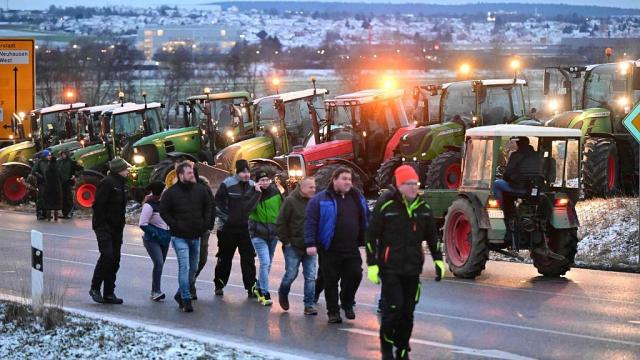German farmers have taken to the streets in a series of protests against the government’s proposed economic and agricultural policy changes, raising concerns about reduced subsidies for the sector. The demonstrations, marked by tractors blocking roads and highways across the country, highlight the escalating tension between the farming community and policymakers.
Growing Discontent Over Policy Changes: Germany

The root of the discontent lies in the government’s plans to reduce or withdraw tax breaks for the agriculture sector, a move that was announced in late December as part of the 2024 budget. Among the proposed changes were subsidy cuts for fuel usage by farmers and alterations to tax breaks for farming vehicles. These proposals sparked anger among farmers who argue that such changes could jeopardize their livelihoods.
Protesters carried signs with messages like “no farmer, no food, no future” and expressed fears that if farmers were financially burdened to the point of ruin, Germany would be forced to import more of its food. Some signs called for new elections, labeling the coalition government as “senseless” and “incompetent.” Local media reported instances of farmers dumping hay, animal feed, and manure on roads to block them, further intensifying the protests.
Adjustments in Response to Farmer Uproar
In response to the widespread discontent, the government has made some adjustments to its initial plans. Last week, officials announced that tax exemptions for agricultural vehicles would continue, and subsidies for fuel would be gradually phased out rather than abruptly eliminated. However, these concessions have not been sufficient to appease the German Farmers’ Association, which believes that the steps taken so far fall short of addressing the core concerns of the farming community.
The 2024 budget plans, which include significant cuts and limitations, were necessitated by a financing hole worth tens of billions of euros. This shortfall arose after the constitutional court ruled that reallocating emergency Covid-19 funds to the current budget was unlawful. The economic challenges faced by farmers are compounded by global uncertainties, price pressures from discount supermarkets, and the dominance of large slaughterhouses and dairy producers.
Calls for Serious Dialogue Amidst Political Pressure

The protests have prompted lawmakers from various political parties, including those within the coalition government, to call for a reevaluation of the policy plans. The situation adds pressure to a government already under intense scrutiny. Germany’s Minister for Economic Affairs and Climate Action, Robert Habeck, acknowledged the economic pressures faced by farmers, noting the structural issues that prevent them from passing on higher production costs.
In a video address, Habeck emphasized the need for “serious and honest” debates about potential solutions. He acknowledged that farmers work tirelessly, often under economic and price pressures, and called for collaborative efforts to find comprehensive solutions to the challenges faced by the agricultural sector.
One regional farmer’s association, expressing solidarity with the protests, emphasized the broader implications for Europe-wide competitiveness by German agriculture, the future of local produce, and jobs in the agriculture industry. The demonstrations underscore the complexities of navigating economic pressures, environmental sustainability, and the livelihoods of those engaged in agriculture.
As the protests continue to draw attention to the plight of German farmers, the government faces a critical juncture in finding a balanced approach that addresses the economic concerns of farmers while ensuring the sustainability of agricultural practices in the country. The ongoing demonstrations serve as a reminder of the intricate challenges involved in shaping agricultural policies that meet the needs of both farmers and the broader community.
